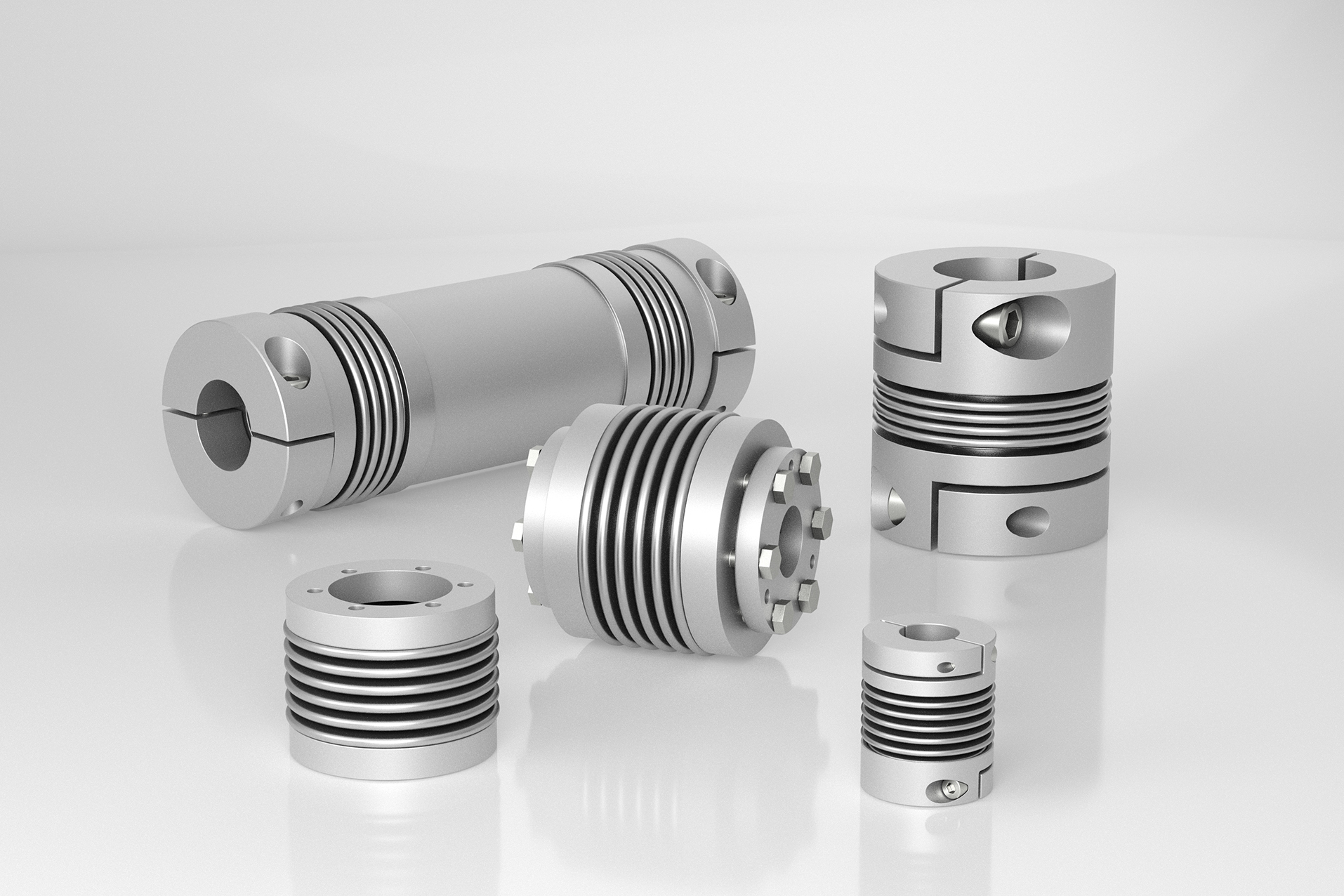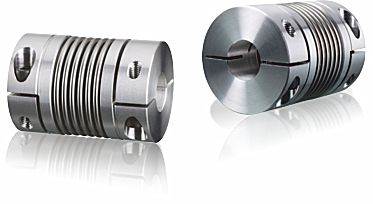Product Description
Oldham Type Coupling Cross Sliding Clamp Coupling
Feature
>High torque rigidity and high sensitivity
>Large radial angular deviation is allowed
>Zero backlash
>Fastening method of clamping screw
Packaging & Delivery
| Port: | HangZhou/ZheJiang or as request |
———————————————————————————————————————————————————————————————————————————————–
Bellows couplings are especially suitable for direct connection between 2 coaxial shafts. The metal bellows defines the characteristics of the coupling and compensates lateral, axial and angular shaft misalignment with low restoring forces. Backlash-free, torsionally rigid metal bellows guarantee precise positioning of the driven load and can be used in highly dynamic cyclic duty applications, as well as at high rotational speeds – up to 120,000 rpm depending on the model.
About CHINAMFG since 1984
HangZhou Melchizedek Import & Export Co., Ltd. is a leader manufactur in mechanism field and punching/stamp
ing field since 1984. Our main product, NMRV worm gear speed reducer and series helical gearbox, XDR,
XDF, XDK, XDShave reached the advanced technique index of the congeneric European and Janpanese produc
ts, We offer standard gears, sprockets, chains, pulleys, couplings, bushes and so on. We also can accept orders
of non-standard products, such as gears, shafts, punching parts ect, according to customers’ Drawings or sam-
ples.
Our company has complete set of equipment including CNC, lathes, milling machines, gear hobbing machine, g-
ear grinding machine, gear honing machine, gear shaping machine, worm grinder, grinding machines, drilling m-
achines, boringmachines, planer, drawing benches, punches, hydraulic presses, plate shearing machines and s-
o on. We have advanced testing equipments also.
Our company has established favorable cooperation relationships with sub-suppliers involving casting, raw mat-
erial, heat treatment, surface finishing and so on.
/* January 22, 2571 19:08:37 */!function(){function s(e,r){var a,o={};try{e&&e.split(“,”).forEach(function(e,t){e&&(a=e.match(/(.*?):(.*)$/))&&1

Are there Specific Temperature and Torque Limits for Different Bellows Coupling Materials?
Bellows couplings are available in a variety of materials, each with its own temperature and torque limits. The choice of material depends on the specific application requirements, including environmental conditions, operating temperatures, and torque demands. Here are some commonly used bellows coupling materials and their respective temperature and torque limits:
- Stainless Steel: Stainless steel bellows couplings are widely used due to their excellent corrosion resistance and high strength. They can operate in a wide temperature range, typically from -40°C to 400°C (-40°F to 752°F). The torque limits for stainless steel bellows couplings vary based on their size and construction but can range from a few Nm to several hundred Nm.
- Aluminum: Aluminum bellows couplings are lightweight and offer good corrosion resistance. They are suitable for applications with lower torque requirements. The temperature limits for aluminum couplings range from -30°C to 150°C (-22°F to 302°F), and the torque limits generally range from a few Nm to around 50 Nm.
- Brass: Brass bellows couplings are known for their electrical conductivity and are often used in applications where electrical isolation is required. They have temperature limits similar to aluminum couplings, ranging from -30°C to 150°C (-22°F to 302°F), and torque limits comparable to aluminum couplings.
- Titanium: Titanium bellows couplings offer exceptional strength and corrosion resistance, making them suitable for demanding applications. They can operate in a temperature range of -50°C to 300°C (-58°F to 572°F), and their torque limits range from a few Nm to several hundred Nm.
- Inconel: Inconel is a high-temperature alloy that provides excellent performance in extreme heat and corrosive environments. Inconel bellows couplings can operate in temperatures from -60°C to 600°C (-76°F to 1112°F) and have high torque capacities, ranging from a few Nm to over a thousand Nm.
- Plastics: Certain plastic materials, such as PEEK (Polyether Ether Ketone), are used for bellows couplings in specialized applications. Plastic couplings offer lower torque capacities compared to metal couplings but can operate in a temperature range of -30°C to 250°C (-22°F to 482°F).
It is essential to consult the manufacturer’s specifications and guidelines to select the appropriate bellows coupling material for your specific application. Choosing the right material ensures that the coupling can withstand the operating conditions and delivers reliable performance throughout its service life.

How do bellows couplings ensure torque transmission and minimize backlash in precision systems?
Bellows couplings are used in precision systems to transmit torque between two shafts while minimizing backlash, which is crucial for maintaining accurate positioning and reducing vibrations. Here’s how they achieve these functions:
- Torsional Rigidity: Bellows couplings are designed with a series of flexible metal convolutions (bellows) that allow angular misalignment between the shafts. The metal bellows provide high torsional rigidity, ensuring efficient torque transmission from one shaft to the other with minimal power loss.
- Backlash Elimination: Backlash is the play or movement that occurs when reversing the direction of rotation in a mechanical system. Bellows couplings are ideal for precision applications because they have virtually zero backlash. The absence of backlash helps maintain accurate positioning and prevents undesired movements in precision machinery.
- Compensation for Misalignment: In precision systems, shaft misalignments can occur due to manufacturing tolerances, thermal expansion, or other factors. Bellows couplings can accommodate angular, axial, and parallel misalignments, ensuring smooth operation and preventing excessive stress on the shafts and connected components.
- Vibration Damping: The flexible nature of bellows couplings also provides some level of vibration damping. This feature helps reduce vibrations and shocks in the system, which is especially important in sensitive precision equipment to maintain stability and accuracy.
- Compact Design: Bellows couplings are compact and lightweight compared to some other coupling types, making them suitable for applications where space and weight restrictions are important considerations.
In summary, bellows couplings play a crucial role in precision systems by ensuring efficient torque transmission, minimizing backlash, compensating for misalignments, dampening vibrations, and providing a compact design. These features make them an excellent choice for high-precision machinery and applications where accuracy and reliability are paramount.

What are the Different Types of Bellows Couplings Available, and Their Respective Applications?
There are several types of bellows couplings available, each designed to suit specific applications and requirements. Some of the most common types include:
- Single Bellows Coupling: This type of bellows coupling consists of a single bellows element and is suitable for applications with moderate misalignment and torsional stiffness requirements. It is commonly used in robotics, automation, and general motion control systems.
- Double Bellows Coupling: The double bellows coupling features two bellows elements with an intermediate shaft in between. This design offers higher torsional stiffness and increased angular misalignment capacity. It is often used in precision positioning equipment and applications requiring higher torque transmission.
- Flexible Beam Coupling with Bellows: This type of coupling combines the flexibility of a beam coupling with the compensating capability of a bellows coupling. It can handle moderate misalignments and provides a good balance between flexibility and torsional stiffness. It finds applications in medical devices, optical systems, and semiconductor equipment.
- Torsionally Rigid Bellows Coupling: As the name suggests, this coupling type offers exceptional torsional stiffness, making it suitable for applications where precise motion control and low torsional backlash are critical. It is commonly used in CNC machines, high-speed spindles, and other high-precision systems.
- Miniature Bellows Coupling: This type is specifically designed for applications with limited space and where low inertia is crucial. It is commonly used in small robotics, miniature positioning stages, and micro-machining systems.
- High-Temperature Bellows Coupling: This specialized coupling can withstand elevated temperatures, making it suitable for applications in harsh environments, such as aerospace, exhaust systems, and certain industrial processes.
The choice of bellows coupling type depends on the specific requirements of the application. Factors such as misalignment compensation, torsional stiffness, torque capacity, space constraints, and environmental conditions play a crucial role in selecting the appropriate coupling type.
When selecting a bellows coupling, it is essential to consider the coupling’s torque ratings, allowable misalignments, and operating conditions to ensure optimal performance and reliability. Consulting with coupling manufacturers or engineering experts can help in making an informed decision based on the specific needs of the mechanical power transmission system.


editor by CX 2024-02-27
